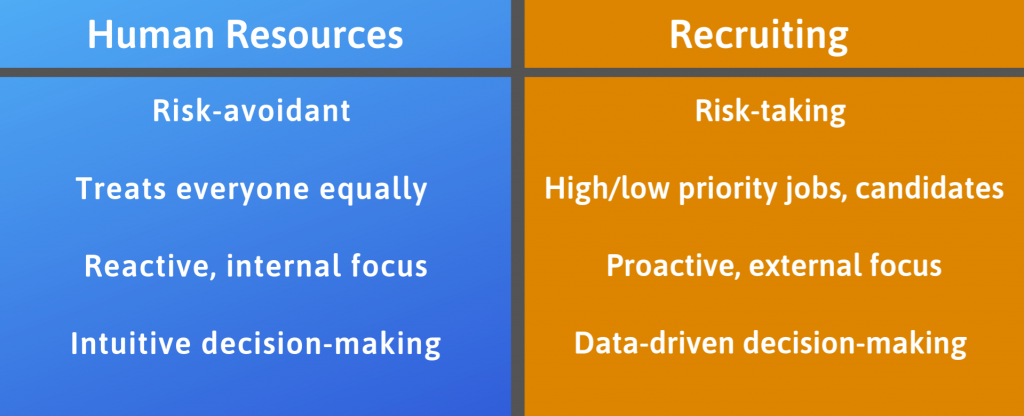
26 Mar Has Talent Acquisition Outgrown its Relationship with HR?
The war for talent rages on, and you’re on the losing side if you’re not aggressively recruiting candidates.
In today’s market, businesses that want to remain competitive are finding that they need to ramp up their recruiting processes to source and employ the best candidates. Some talent acquisition specialists cite a skills gap or a shortage of available talent for this shift in the acquisition environment, but others recommend that recruiting teams look internally for the source of their difficulties – specifically at the relationship between their acquisition function and human resources department.
Though recruiting has been a fundamental aspect of HR for decades, an increasing number of acquisition specialists believe that talent acquisition deserves its own seat at the table.
Professional Takes – Recruiting as an Independent Business Function
Online, you’ll find no shortage of people in talent acquisition requesting that the recruiting function becomes independent from HR. Dr. John Sullivan, a professor and HR-thought leader in Silicon Valley, analyzes the differences between the functions before sharing his visionof what recruiting could be if it was an independent business function rather than one of human resources.

“Recruiting will transition from an overhead role into a business function with more direct accountability. And, with its higher strategic mission, its primary goal will move beyond simply filling positions. Instead, it will serve a business purpose by hiring exceptional performers who will immediately boost the business results of the teams that they join. Its independence will enhance its chances of success because it will be able to build a strong culture with a singular focus and no HR distractions.”
Risk: Innovation is necessary to stay competitive in the world of recruiting, and innovation comes with varying degrees of risk. It’s HR’s job to minimize risk and protect the company and its employees at all costs.
Treatment: HR is required to treat all candidates and employees equally, and that’s clearly beneficial for the proper functioning of an organization. However, there’s a big difference between hiring a CFO or AI specialist and hiring a salesperson – recruiting would be more effective if treatment could be prioritized for game-changing hires.
Focus: Recruiters and talent acquisition specialists are constantly looking externally, whether it’s at their competitors, the market, for candidates, or for new technologies. HR’s main responsibility as a department lies in making sure that everything is running smoothly under the hood – their job is to monitor the internal work environment and culture, confirming that employees are able to work together productively and cooperatively.
Decision-making: Problems between employees are rarely simple cut-and-dry matters, and an intuitive decision-making approach is useful in this type of HR situation. On the other hand, the world of recruiting is increasingly digital and data-focused, and intuitive decision-making will no longer get you the best candidates. Recruiting is now scientific in nature, and as a result decision-making regarding the function should be driven by data.
A Strategic Opportunity
It’s not difficult to see that talent acquisition and recruiting are worlds apart from human resources, and that the functions are dissimilar enough that they shouldn’t be lumped together. Streamlining recruiting and turning it into a standalone function is a strategic opportunity that organizations are missing out on for the sake of ease and tradition.
It should be noted that limiting your recruiting team’s abilities can spell serious consequence for your profit margins – recent data published by the Boston Consulting Group disclosed that recruiting has the highest revenue and profit impacts of all HR functions, and that isn’t likely to change anytime soon.
None of this is to say that HR doesn’t serve a vital purpose in organizations, merely that recruiting and HR functions have grown less compatible in today’s talent acquisition market and the relationship is no longer serving the purpose it once did. The goals, strategies, and focuses of each function are just too far removed from each other for the association to be of extensive benefit.
Professional Takes – HR-A and HR-LO
Ram Charan, long-time Harvard Business Review writer and adviser to the CEO’s of some of the world’s largest organizations, shares his critiques on the structure of HR in the modern workplace. With his “bare outline”, Charan proposes that the title of Chief Human Resource Officer (CHRO) is eliminated and that HR is split into two strands: HR-A (administration) and HR-LO (leadership and organization).
HR-A employees will report to the CFO, their primary responsibilities being managing benefits and compensation.
HR-LO employees will improve the people capabilities of their respective businesses and report to the CEO. Charan foresees this function being run by high-potential workers with experience in operations and finance, as their history working in these disciplines would aid them in linking the company’s social system and culture to it’s financial performance. HR-LO leaders would also be responsible for developing and assessing their staff to ensure that high potentials are continuously employed.
Charan ultimately believes that HR would be more effective if a segment of the department was operated by employees with finance and operations backgrounds; working in HR would give them the opportunity to strengthen their people skills, while their work experience could reveal trends that aren’t noticeable to those without a business education.
Change doesn’t happen overnight, and Charan knows this well. “I expect to see plenty of opposition to it. But the problem with HR is real. One way or another, it will have to gain the business acumen needed to help organizations perform at their best.”
Do you agree with Sullivan or Charan’s approaches to evolve and adjust HR? Do you believe that the relationship between HR and recruiting is still beneficial for both functions? Leave a comment on our LinkedIn or Facebook letting us know what you think!
——————————————————————————————————————————————————————————————————–
If you’re in search of recruiting services or could use help determining your business needs, contact our team of experienced talent acquisition consultants now.


